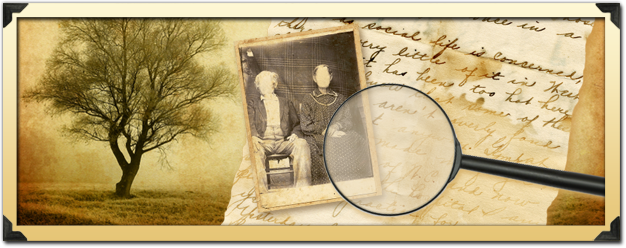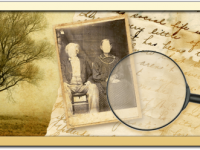Names Not Spelled the Same
The concept of exact spelling has evolved over time, even personal name spelling. It is especially important in the computer age to have consistency in name spellings, but not so crucial in times past.
Seasoned genealogists know that name spelling varied almost as widely as the people recording them. Clerks and census takers often spelled a name phonetically, not bothering to ask their subjects what spelling they preferred. Literacy came into vogue slowly among common people throughout the Nineteenth Century. Many people living before 1900 truly did not know how to spell their own name!
Several years ago, this genealogist worked with a client visiting Salt Lake City, researching censuses on microfilm in the Family History Library. The ancestral family was located in the anticipated place of residence. The given names of each of the parents and children all matched up with what the client already knew. It pleased me to be able to help her find her ancestors in the federal census in the mid-1800’s. Suddenly, she flipped the microfilm reader handle into reverse and rapid rewind. “That’s not the right family. They did not spell their name like that!” The census enumerator misspelled the surname by one letter. I could not convince her that we had indeed found the right family.
Being hung up on exact spelling can really hamper the research process. Thankfully, most research sites for historical records offer soundex or fuzzy spelling search options. This researcher has an ancestor who lived in Indiana in the 1840’s with the surname Minnix. A deed of land sale, written by the county clerk, utilized three different spellings of the name: Minnix, Minix and Menix. It just didn’t matter, as long as everyone understood to whom the transaction pertained. The intent was understood. The descendants who settled in Kentucky stuck with the Minix spelling, while others preferred the Minnix version.

We can all agree that William Shakespeare (1564-1617) was one of the most educated literary figures of his time. We have six surviving examples of his signature in his own hand. Remarkably, he varied the spelling of his surname in each one. No two signatures reflect the same spelling! William wrote his will in his own hand, using the phrase, “I, William Shakespeare…” in three places. Again, he spelled his own last name differently each of the three times!
Trained genealogists are adept at recognizing variant spellings. Another factor at play is that indexing in both digital and printed sources is notoriously subject to human error. ‘Folger’ might look like ‘Folyer’, or ‘Arthur’ like ‘Author’. Just recently, I saw the given name ‘Winnefred’ indexed as ‘Wumoford’. We have to employ flexibility in our analysis of historical records.
Genealogy research is a very inexact science! But we relish the challenge.
The concept of exact spelling has evolved over time, even personal name spelling. It is especially important in the computer age to have consistency in name spellings, but not so crucial in times past.
Seasoned genealogists know that name spelling varied almost as widely as the people recording them. Clerks and census takers often spelled a name phonetically, not bothering to ask their subjects what spelling they preferred. Literacy came into vogue slowly among common people throughout the Nineteenth Century. Many people living before 1900 truly did not know how to spell their own name!
Several years ago, this genealogist worked with a client visiting Salt Lake City, researching censuses on microfilm in the Family History Library. The ancestral family was located in the anticipated place of residence. The given names of each of the parents and children all matched up with what the client already knew. It pleased me to be able to help her find her ancestors in the federal census in the mid-1800’s. Suddenly, she flipped the microfilm reader handle into reverse and rapid rewind. “That’s not the right family. They did not spell their name like that!” The census enumerator misspelled the surname by one letter. I could not convince her that we had indeed found the right family.
Being hung up on exact spelling can really hamper the research process. Thankfully, most research sites for historical records offer soundex or fuzzy spelling search options. This researcher has an ancestor who lived in Indiana in the 1840’s with the surname Minnix. A deed of land sale, written by the county clerk, utilized three different spellings of the name: Minnix, Minix and Menix. It just didn’t matter, as long as everyone understood to whom the transaction pertained. The intent was understood. The descendants who settled in Kentucky stuck with the Minix spelling, while others preferred the Minnix version.

We can all agree that William Shakespeare (1564-1617) was one of the most educated literary figures of his time. We have six surviving examples of his signature in his own hand. Remarkably, he varied the spelling of his surname in each one. No two signatures reflect the same spelling! William wrote his will in his own hand, using the phrase, “I, William Shakespeare…” in three places. Again, he spelled his own last name differently each of the three times!
Trained genealogists are adept at recognizing variant spellings. Another factor at play is that indexing in both digital and printed sources is notoriously subject to human error. ‘Folger’ might look like ‘Folyer’, or ‘Arthur’ like ‘Author’. Just recently, I saw the given name ‘Winnefred’ indexed as ‘Wumoford’. We have to employ flexibility in our analysis of historical records.
Genealogy research is a very inexact science! But we relish the challenge.
Raquel Lindaas, AG




